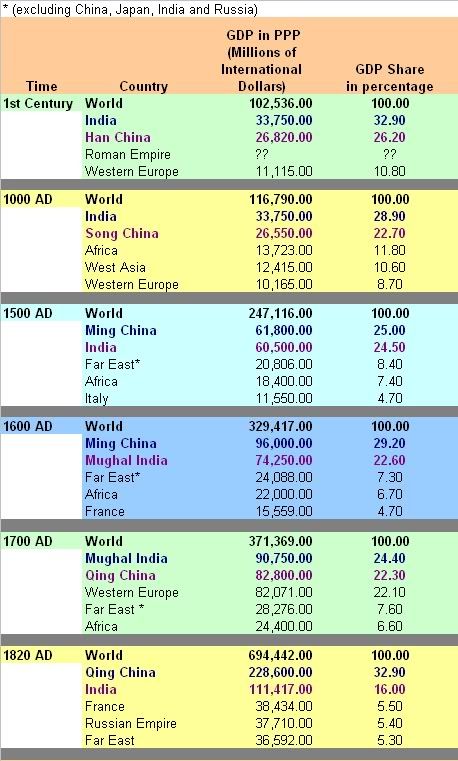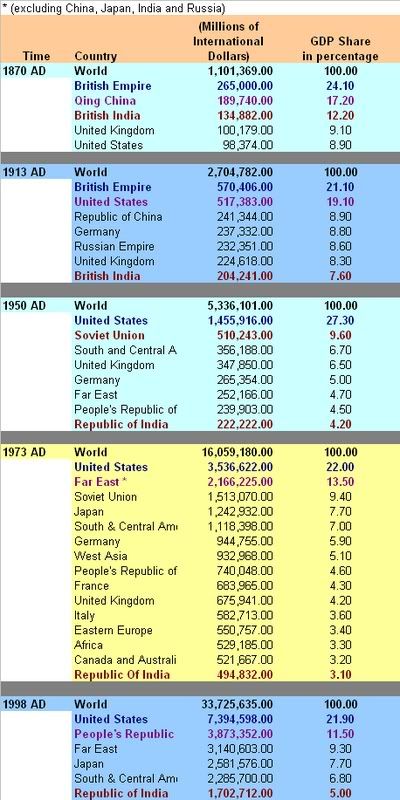Battle Against Ayurveda is a Fight for Our Survival
The Case against Patanjali by Indian Medical Association and the tone of Judiciary is alarming. We need to look into its historical and global context to fully grasp its ramification.

India is a poor country today. But was it always like that? If you look at the GDP figures (courtesy: Wikipedia) of India vs the rest of the world – the journey is extremely interesting. For most part of the two millenia, India and China simply ruled the world.
Until 1000 AD India was clearly well and truly the richest country. The share of the World’s GDP was around 30% for the first millenia. Then by 1500 AD the Islamic rulers had started making their raids from North, and the Hindu Kings had started becoming weak. From a country where spirituality and rule of law was paramount, India, suddenly was losing in its own web.

Then by 1600 AD, the Mughals were ruling India, and it went down further. The roles of China and India in the world’s economic dominance were now truly reversed. In
1000 AD, the shares were
India – 28.90/
China – 22.70; and
in 1600the shares had changed to
India – 22.60/
China – 29.20. Whereas the Ming dynasty had done wonders for China, Mughals had brought it down. It was the rule of Akbar and then Jahangir and Shahjahan, that India regained its numero uno position back, probably also helped by the Qing dynasty in China.
A country that was at the peak of science and technology edge was in 600-700 years of rule of Islam and self-serving Hindu rulers, had been slowly but gradually lost the urge to succeed and grow. This period – the Mughal period – is, in my personal view, the one time that broke the back of progressiveness in the Indian (Hindu) ethos – culturally and scientifically. We were to pay for such lack of urgency.
We had many invaders but none made India as poor as the British. They systematically took the wealth of the country out and replaced it with total dependence! All that was done in the name of “free-trade”… where the work was moved to a place where it was done best. So, our raw material was taken out and we got expensive finished goods back. We paid for lack of preparation.
Law of Personal and Societal Growth
No one – a person in his/her career or life or a society – grows in linear manner constantly. Everything grows up and down in curves interspersed with plateaus. These plateaus are the times that the preparation for the next level should be made. Decisions taken in life of a person and an organization ultimately decide which way the curve will move.. up .. or down. In India’s case, religion had clouded the normal life. We were forgetting to live in harmony with science and nature.. but were adamant to use religion to define what nature was. True Science will always be at odds with Religion, and always be in harmony with spirituality. For spirituality, like science is an exploration. Honest and clear and no-nonsense. It does not and should not define a result before it is achieved. There are no conjectures, or strict laws on how the final result of a step forward should be. In anticipation is the salvation of the exploration.

If that was all, it would have been fine, worst was the money from treasury was usurped back to England or to fund more and more wars for colonization. The money was slowly but surely taken out. Bengal famine and many other such horrendous events resulted.
Once the richest country was brought to its knees. If India is resurgent today, it is because of its inherent strength of character.. its Civilizational character. It takes a certain set of characteristics to create a nation. But it takes a whole lot of different characteristics to create a civilization. A Civilization has an inherent strength of creating and re-creating itself while remaining the same. Most other civilizations – like Greek, Roman, and Chinese have lost their basic character, but India still retains its 5000 years old (I personally believe it to be at least 10,000 years but I did not write the history, the British did) ethos while becoming modern.
These things have been said by many people, but I will provide here the economic data to show how it was to demonstrate the strength and fall of India as an economic power.(pointed to me by my friend, Sanjay Goel)
Within a period of 90-odd years, the British virtually drained India’s economy dry! From the top economic power in 1820 with a share of 16% of the World’s GDP, India came down to just 7.6% in 1913.
It was not as if the misery of India was gone with the Brits. The first generation of free Indians left a lot to be desired. That generation collectively set India on a terrible downward turn.
There were two main issues, in my personal opinion, that contributed to the downward trend.
Idealism without adequate Practicality: Personal Idealism should be translated into rule of law not just generally felt self-aggrandisement. But that is what really happened! Right from Gandhi downward, every person was Idealist not because they wanted to set Rule of Law, but they would often flout those very laws. Dictatorship of Idealists though subtle was unmistakeable!
Vision abandoned for Rejoicing of the Moment: What that generation lack was simply vision. That generation was consumed in the occasion of the time. Meanwhile, the population increased by leaps and bounds. Suddenly, in 50 years time, a population that was “manageable” had turned monumental, while the infrastructural growth was inadequate to handle any growth.
It wasn’t until the Indian mind – that was responsible for India’s original economic peak, started the reverse journey. As the economy was unfettered, the Indian techies, under the radar of the Government bureaucracy performed a miracle. It used the common talent from the NIIT’s and Aptech’s to use Y2K to the most telling effect. The GDP share had risen from a miserable 3.10% to 5.00% amidst great competition in the World Economy.
Powered by Qumana
Every Sunday AM (US Time)/ PM (India time), we send out a weekly detailed newsletter. We also share other insightful notes during the week. Its free. Do sign up and share with friends!